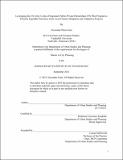Leveraging the US Army Corps of Engineers Public-Private Partnerships (P3) Pilot Program to Promote Equitable Outcomes from Local Climate Mitigation and Adaptation Projects
Author(s)
Gant, Alexander Paine
DownloadThesis PDF (2.146Mb)
Advisor
Susskind, Lawrence
Terms of use
Metadata
Show full item recordAbstract
As the negative impacts of a rapidly changing climate continue to exacerbate structural inequities across all sectors and scales, U.S. communities and citizens are increasingly at risk of physical, economic, and environmental harms. Directed federal investment in climate mitigation can reduce disproportionate burdens on at-risk populations, while also providing substantial economic benefits to those individuals and communities. The US Army Corps of Engineers has been the nation's premier flood management agency since the mid-19th century and is uniquely equipped to provide technical and financial support to such communities.
In this client-based thesis, I worked with Aaron Snyder, Lead of the Corps' Water Infrastructure Financing Program and Director of the Corp’s Public-Private-Partnership (P3) program, to evaluate the Corps' role in developing and stewarding resilient civil works and public infrastructure. We focused on the Corp's role of providing flood protection infrastructure in response to the stressors of increasingly frequent and intense natural disasters. Our goal was to assess how the Corp's recently introduced P3 program can be improved to alleviate disproportionate cost-burdens on at-risk communities. Illustrated through case studies of weather and water disasters in Nashville, TN; New Bern, NC; Richwood, WV; and Fargo, ND; we find that the theoretical foundations of the cost-benefit analyses currently employed at the onset of the Corp's water resource management projects substantially limits availability and access of federal aid to communities who need it most. We conclude that the new P3 program, if directed to promote equitable outcomes from local climate mitigation and adaptation projects, would allow the Corps to more accurately assess project feasibility, prioritize projects sponsored by non-federal partners, leverage progressive local funding mechanisms, and ultimately reduce climate risks in vulnerable communities while meeting USACE’s mission of protecting U.S. Citizens, reducing disaster risk, and providing vital infrastructure needs and solutions.
Date issued
2021-09Department
Massachusetts Institute of Technology. Department of Urban Studies and PlanningPublisher
Massachusetts Institute of Technology